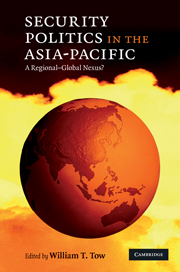Book contents
- Frontmatter
- Contents
- List of illustrations
- About the contributors
- Preface
- Acknowledgements
- List of abbreviations
- 1 Setting the context
- Part I
- Part II
- Part III
- 11 Problematising ‘linkages’ between Southeast Asian and international terrorism
- 12 Nuclear weapons: Asian case studies and global ramifications
- 13 Maritime security: regional concerns and global implications
- 14 Thinking globally and acting regionally: securitising energy and environment
- 15 Regional health and global security: the Asian cradle of pandemic influenza
- Part IV
- References
- Index
14 - Thinking globally and acting regionally: securitising energy and environment
Published online by Cambridge University Press: 05 June 2012
- Frontmatter
- Contents
- List of illustrations
- About the contributors
- Preface
- Acknowledgements
- List of abbreviations
- 1 Setting the context
- Part I
- Part II
- Part III
- 11 Problematising ‘linkages’ between Southeast Asian and international terrorism
- 12 Nuclear weapons: Asian case studies and global ramifications
- 13 Maritime security: regional concerns and global implications
- 14 Thinking globally and acting regionally: securitising energy and environment
- 15 Regional health and global security: the Asian cradle of pandemic influenza
- Part IV
- References
- Index
Summary
In evaluating issues within the so-called ‘new agenda’ in security studies, it is tempting to offer prescriptions addressing problems that affect world politics at the transnational and global levels of analysis. This is particularly the case for environmental issues, which have become progressively securitised within the discourse on international relations (Homer-Dixon 2001). To resolve environmental dangers such as resource depletion, energy security and anthropogenic climate change, much of the prevailing wisdom favours recourse to global civil society and global institutions (Barton et al. 2004). An under-appreciated fact here is that regional dynamics can affect outlooks towards global solutions perceived as the best way to address environmental problems in a variety of ways. On the one hand, excessive reliance on regionalism can make this task problematic. Conversely, however, regional solutions have in fact often proven far more appropriate than an exclusive reliance on global norms and laws, not to mention a weak global civil society that is still in its infancy.
In this chapter I explore this regional–global problématique in international environmental governance, with specific reference to the Asia-Pacific. I do so briefly in relation to various multilateral environmental agreements (MEAs), and more expansively in relation to the regulation of trade in hazardous waste. I then conclude by examining in some detail the regional differences between Europe and the Asia-Pacific on the climate change issue, outlining the way in which the Eurocentric nature of the Kyoto Protocol contributed to its failure as a basis for developing effective responses to the issue.
- Type
- Chapter
- Information
- Security Politics in the Asia-PacificA Regional-Global Nexus?, pp. 266 - 283Publisher: Cambridge University PressPrint publication year: 2009



